Karzai rules out Iraq scenario in Afghanistan
- Published
Lyse Doucet asked Hamid Karzai about his proudest moment as he prepares to step down
Both Iraq and Afghanistan were the target of major US-led wars, both are besieged by strong insurgencies, and both are still struggling to establish solid institutions.
In Kabul this week, Afghans kept bringing up the dramatic developments unfolding in Iraq, where radical Islamist fighters stunned many with their lightning sweep into key cities.
"Its a lesson to us," warned one Afghan MP.
"Did you see how they are slaughtering Shias?" lamented a Afghan friend who is from the same sect.
So, when we went to the heavily fortified palace to interview President Hamid Karzai about his last 12 years in power, the questions about the years to come loom even larger.
Could what's happening in Iraq happen in Afghanistan?
"Never. Not at all," is the Afghan leader's emphatic reply.
Could there be sectarian strife?
"Not at all. Not all all. We are a united country."
What makes him so confident?
"The Afghan people," he replies, without hesitation.
'Fraternal advice'
Iraq's deep sectarian divide has no parallel in Afghanistan - despite past incidents of tension between the country's majority Sunni population and the Shias, who are mainly of Hazara origin.
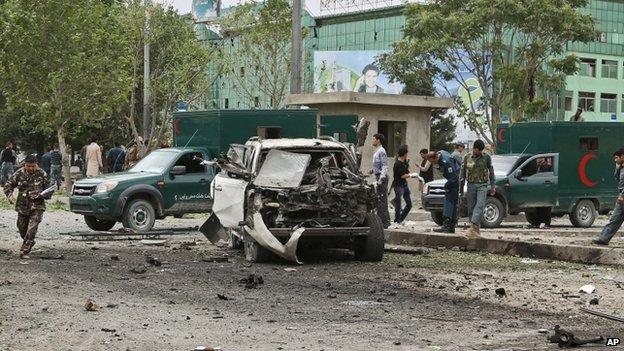
Afghanistan has been recently rocked by a series of deadly attacks
And President Karzai dismisses any possible repeat of the dramatic collapse of Iraqi security forces in the face of an onslaught by fighters of the Islamic State in Iraq and the Levant (ISIS).
He hails the performance of Afghan security forces in this year's presidential elections, despite significant Taliban threats and attacks.
But this is still a country which, despite billions of dollars in aid and years of Western training of its security forces, is still plagued by horrific violence by Taliban and other armed groups.
Last December, Iraqi Foreign Minister Hoshyar Zebari flew into Kabul and offered some fraternal advice to the Afghan president: resolve your differences with Washington and sign the security pact (known as the Bilateral Security Agreement), which would provide for a long-term US military presence in your country.
"I thanked him for his advice," President Karzai tells me. "But I have my views, and my information, from working in Afghanistan for more than 12 years."
Impassioned pitch
The brutal assault by Islamist forces poses the worst threat to Iraq since the last US soldier left in late 2011.
That August, I had flown into Mosul and Baghdad with the US Joint Chiefs of Staff, Adm Mike Mullen, who was making his last trip to Iraq before he stepped down.
As temperatures soared to 53C, making the Iraqi capital the hottest city in the world, Adm Mullen made his last impassioned pitch to convince Iraqi leaders to keep some US troops and bases in their country. He failed.
Top US soldiers and diplomats have also been flying into Kabul in recent years trying to get President Karzai to sign a security pact. They failed.
President Obama recently announced that all US soldiers would come home by the end of 2016.
"I have said I would be willing to sign the BSA if a peace process was signed officially and publically," the president said, referring to possible talks with the Taliban, which have also been obstructed by suspicion and setbacks.
"We do need international support where we don't have the means to sustain ourselves," he acknowledges. "But the protection of the country is the work of Afghans."
'Flawed strategy'
The two men vying to become the next president - Ashraf Ghani and Abdullah Abdullah - have both made it clear that signing the BSA would be one of their first priorities when they come to power.
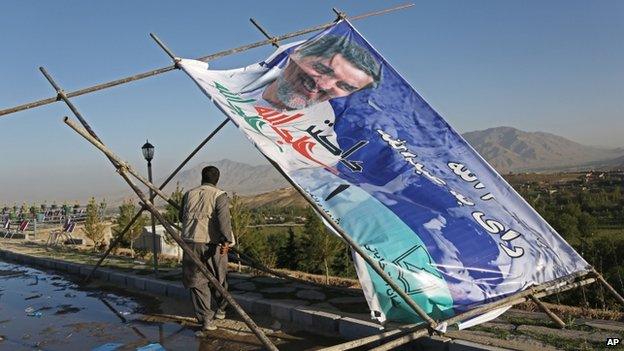
Afghans are hoping for more stability after the presidential elections
But more than a decade of working with Nato forces has left Hamid Karzai deeply mistrustful of Western countries, who were once his closest partners. His wariness, often verging on paranoia, has exasperated and exhausted his erstwhile allies.
The Afghan president now sees the roots of growing instability across the region in Washington's flawed military strategy.
He repeats his often stated view that the "war on terror was not fought genuinely or honestly".
From his earliest years in power he has urged leaders in Washington and other Western capitals to go after the Taliban and other armed groups in their sanctuaries, in other words, in the tribal areas and now the major cities of neighbouring Pakistan.
"I hope that Afghanistan and Pakistan will find a way to root out terrorists and I hope that the US will engage in a realistic truly productive manner in the war on terror if that's what they are here for," he said, keeping open the possibility there could still be progress.
'American puppet'
I point out that his allegation that Washington and its allies were deliberately creating instability in the region both astonishes and angers them.
"I can't say if they intended it this way or not," he replies. "Intentions are hidden from us. I see the results, and the result is the region is a lot more unstable."
The president also reveals that he is in daily contact with the Afghan Taliban, and there had even been "an exchange of letters".
He brushes aside repeated Taliban statements that they would never speak to a leader they derided as an "American puppet". In his view, blame for this failure lies in "bigger, more powerful hands".
As for al-Qaeda, President Karzai says he has "never received a report from our intelligence department or other security establishments that speak of al-Qaeda in Afghanistan".
But he acknowledges the threat from al-Qaeda-linked groups based across the border. Some reports blamed the recent assassination attempt on Abdullah Abdullah on the militant Pakistani group Lashkar-e-Taiba.
And many of the most brazen suicide bombings in Kabul have been traced to Afghan fighters known as the Haqqani network - also known to be connected to al-Qaeda.
When our interview - which includes Afghan colleagues, Meena Baktash and Emal Pasarly - ends, the president returns to the demands of his day.
An official from the Independent Election Commission is waiting to discuss growing tension over allegations of fraud in the last round of the presidential elections.
A delegation from Pakistan has arrived to discuss co-operation against shared threats. His security advisers hover in the corridor.
Afghans have long viewed this critical year of 2014 with apprehension. They have more than enough to focus on, without even pondering the fate that has befallen Iraq - beyond their borders.
- Published7 July 2014
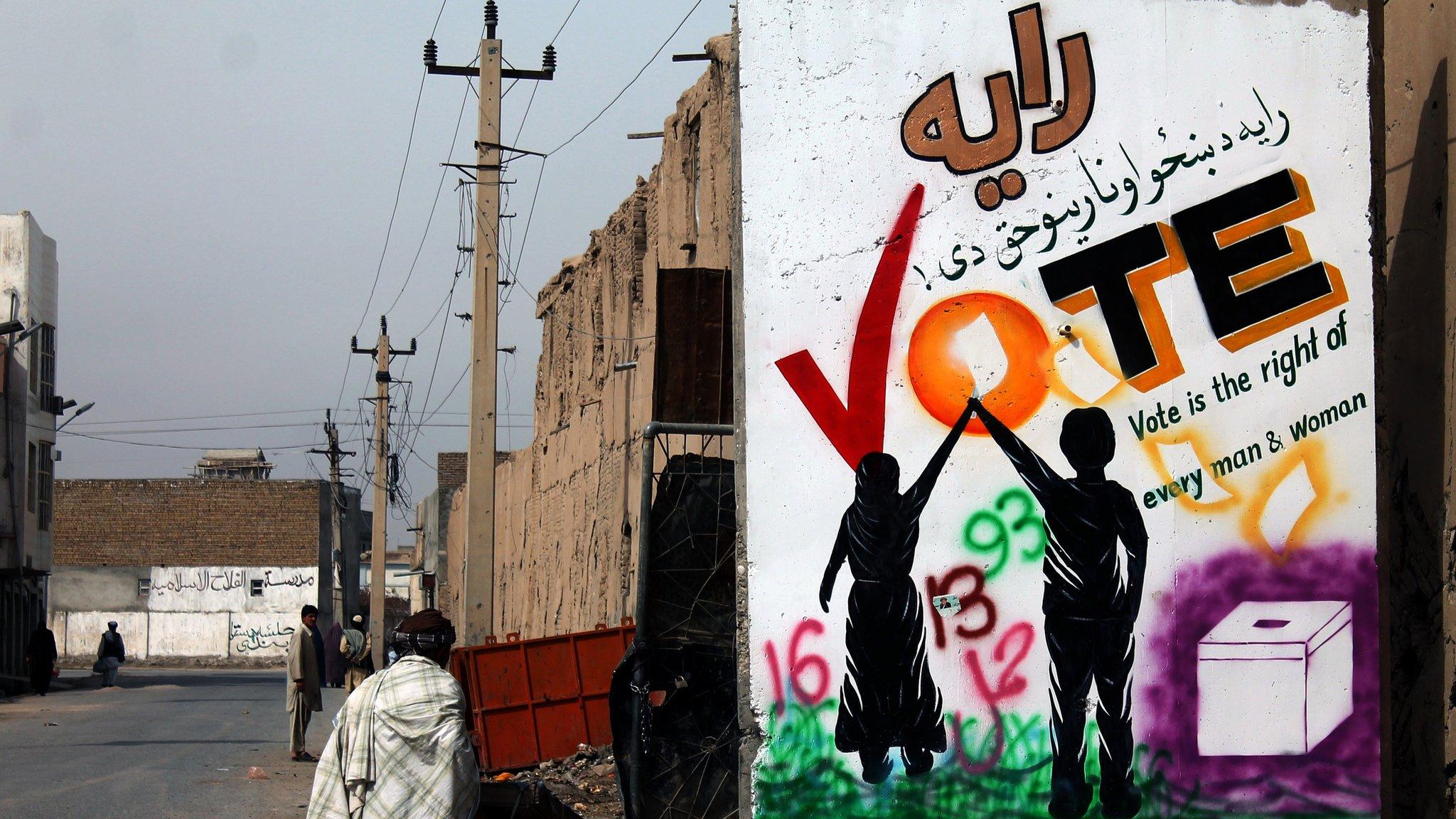
- Published13 June 2014
.jpg)
- Published7 July 2014
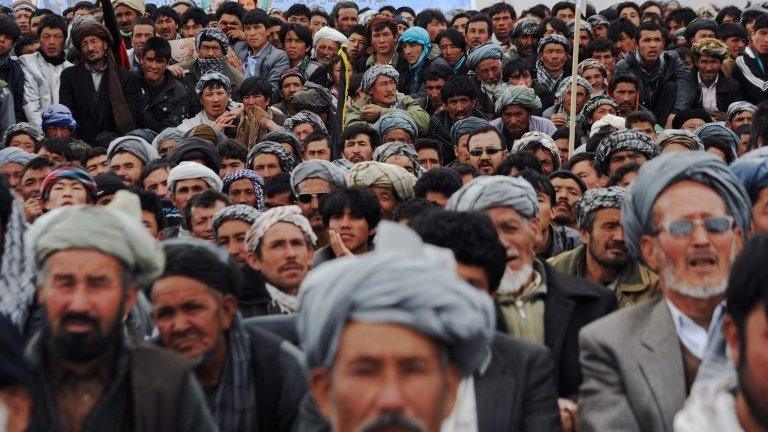
- Published12 June 2014
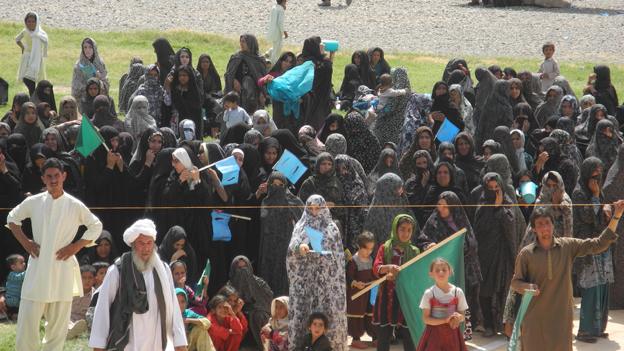
- Published13 June 2014
